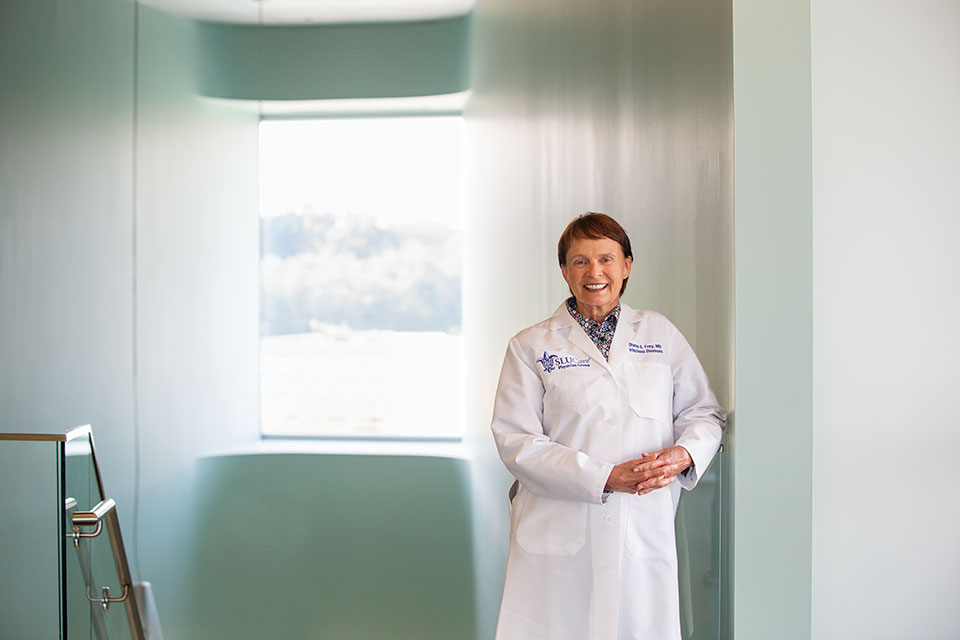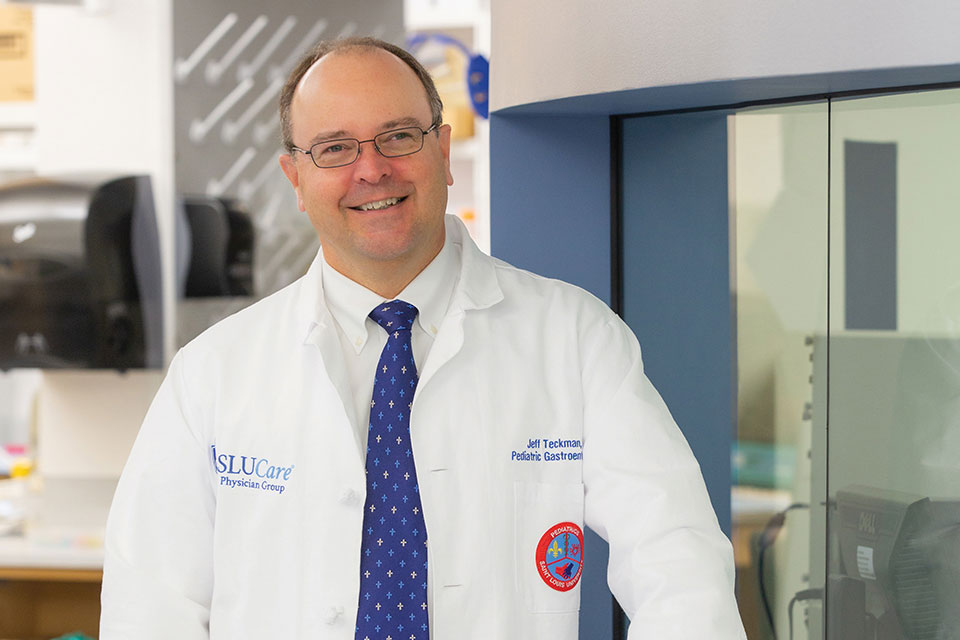Celebrating Our Past and Looking to the Future
For decades, some of the brightest minds in clinical research have called the Saint Louis University School of Medicine home—including Sharon Frey, M.D., Jeffrey Teckman, M.D., and Raymond Tait, Ph.D. Their contributions to the medical field include numerous life-changing discoveries and have established a rich legacy of clinical research at SLU that will take us into the future.
Saving Lives
For over 30 years, Sharon Frey, M.D., clinical director of the Center for Vaccine Development, has been researching infectious diseases. Little did she know that 2022 would present an entirely new chapter in her career as the monkeypox outbreak surged across the globe.
In the early 2000s, Dr. Frey sought to determine whether it was possible to stretch the supply of the smallpox vaccine, Dryvax, in case of a major emergency. Frey’s research determined the smallpox vaccine could be diluted and still retain its potency – one of her most significant scientific achievements.
Frey’s research on the smallpox vaccine served as a springboard for an investigation of the monkeypox vaccine MVA-BN (JYNEEOS) which is also approved for smallpox. The National Institute of Health (NIH) funded Frey’s clinical research. The findings were published in 2015: One-fifth of a vaccine dose administered intradermally provided a protective antibody titer similar to a full dose of vaccine given by the subcutaneous route. “We were very fortunate to have this dose-sparing information available when the WHO declared the monkeypox global emergency. The ability to use one fifth the dose, makes more doses available to the public while we wait for vaccine production to ramp up,” Frey said.
Monkeypox, first recorded in humans in 1970, is typically confined to central and west Africa where it is known to infect African rodents and non-human primates. With the current global emergency, over 28,600 cases have been reported in the US. Vaccination, medication, and public education are believed to be instrumental in decreasing the number and severity of cases.
As the monkeypox outbreak spreads, Frey is revisiting her research and conducting a new clinical trial on the FDA-approved monkeypox vaccine. “We’re looking at the standard formulation and route, the current intradermal dose, and an even smaller intradermal dose,” said Frey.
The dose-sparing intradermal route can expand vaccine access and allow more individuals to be protected across the globe. As she prepares for the upcoming clinical trial, Frey reflects on what a life dedicated to vaccinology has taught her. “The provision of newer and better vaccines is a means to improve public health at the global level. The adage, the more we learn, the less we know, is very true. There’s so much to be discovered. The fields of immunology and vaccinology are wide-open with millions of questions to ask and Saint Louis University is just the place to do it.”
Fueling Collaboration

Raymond Tait, Ph.D., professor in the Department of Psychiatry and Behavior Neuroscience, is leading initiatives regarding integration of research operations across the School of Medicine and SSM Health.
Tait is partnering with SSM leadership to develop a clinical research program that spans the two organizations. “It is a natural partnership,” says Tait. Tait hopes to capitalize on the collaborative momentum and work toward an integrated research operation with SSM Health—with an oncology focus serving as a critical model for future clinical research. “Our goal is to build out a clinical research infrastructure across the SSM Health System, with the School of Medicine as its eventual hub,” said Tait. Current near-term projects include bringing just-in-time oncology trials to the SSM Health System, growing other clinical trial capabilities across the system, and establishing a biobank to support research at the academic campuses.
Tait’s career at SLU expands four decades, as a professor of psychiatry, pain researcher, clinician and program administrator, having a profound impact in each of these areas. In 1982, Tait founded a successful multi-disciplinary treatment program for chronic pain at SLU. Since that time, Tait’s research has focused on a range of topics related to chronic pain. Much of that work examined patient, provider, and environmental factors that systematically influence the assessment and treatment of pain in others. His pioneering work highlights racial and socioeconomic disparities in the treatment provided to people with chronic pain, as well as the outcomes of that treatment.
Over the course of his career, Tait also has studied approaches to the assessment of pain in patients with advanced dementia and ethical challenges in the conduct of research, among other topics. Tait is the author or co-author of more than 100 peer reviewed publications and has been principal or co-principal investigator of grants totaling nearly $3 million. He received the American Pain Society’s 2019 Lifetime Achievement award for clinical pain scholarship and was inducted into the St. Louis Academy of Science in 2020.
Finding a Cure
In order to propel scientific discoveries and breakthroughs, researchers must possess perseverance, determination, and grit. Jeffrey Teckman, M.D. professor of pediatrics, embodies this: He’s devoted 30 years of his life to researching Alpha-1 Antitrypsin deficiency, a liver disease that impacts one in every 3,500 Americans, and his work exemplifies the clinical and translational research process.
In the summer of 2022, Teckman received life-changing news: His team at SLU, along with pharmaceutical companies Arrowhead and Takeda, and international collaborators, developed the first effective drug for Alpha-1 Antitrypsin deficiency, a condition that formerly could only be treated with a liver transplant. “I opened the email with the study results, and I started crying,” he remembers. A few months later, his research, “Fazirsiran for Liver Disease Associated with Alpha-1 Antitrypsin Deficiency,” was published in the New England Journal of Medicine.
As Teckman and his team now work toward FDA approval of the drug, he acknowledges the tremendous effort and support that research requires. “Philanthropy is a key part of this work,” says Teckman. “Donations allow us to access cutting-edge equipment and facilitate this work. We couldn’t develop cures and form collaborations without it.”

